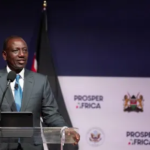The Kenya Association of Manufacturers (KAM) has attributed the increase in products from other East African countries in the Kenyan market to recent tax measures.
Anthony Mwangi, CEO of KAM, highlighted on Wednesday, May 22, 2024, that these new levies and taxes have imposed significant burdens on Kenyan producers, leading them to reduce their production activities.
Rather than engaging in mass production, Mwangi noted that many manufacturers have opted to import products from other East African Community (EAC) markets where costs are more competitive.
He specifically mentioned that Kenya, which was once a major exporter of paper, has now transitioned to importing the product due to the tax changes introduced in 2023.
“Kenya operates within the EAC Common market, COMESA, and now AfCFTA. Any fees, levies, and duties imposed by the Government of Kenya are domestic taxes that affect only Kenyan products and companies. Consequently, Kenyan companies and products become uncompetitive, leading to our market being flooded with products from other EAC and COMESA countries,” Mwangi stated.
“For instance, Kenya used to be the largest exporter of paper and steel products to the EAC, but due to the Finance Act 2023, we have become an importer of these products.”
According to Mwangi, the situation is set to be worsened if the Finance Bill 2024 is passed without amendments. Mwangi argued that the Export Investment Promotion Levy (EIPL) on the paper, steel and cement sectors will have a major negative effect on the construction industry.
In his argument, Mwangi detailed that the cost of construction has increased by 40 per cent due to the new tax policies.
“KAM has analyzed, in detail, the impact of the Export Investment Promotion Levy (EIPL) on the paper, steel and cement sectors and has noted unparalleled negative unintended consequences in those sectors that are crucial to the economy.
“The cost of construction has since gone up by at least 40 per cent due to this unwarranted policy action. Regrettably, we have noted an enhanced list of products under EIPL in the Finance Bill 2024 such as raw materials for manufacturing of paper packaging materials, critical for packaging food products and household items,” he remarked.
Before 2015, we imported diapers and sanitary wear, but since then, we have developed local manufacturing capacity. However, with the introduction of the eco levy, we might see an increase in imports again, as it will become cheaper for consumers to purchase imported products. -… pic.twitter.com/GkXaLYWPOO
— KAM (@KAM_Kenya) May 22, 2024
Mwangi cautioned that the proposed 25 per cent excise duty could lead to an 80 per cent increase in the price of edible cooking oil. Additionally, basic items like mugs and basins would also see price hikes due to the eco levy outlined in the Finance Act 2024.
He explained, “The introduction of a 10 per cent excise duty on plastic products will significantly raise the costs of items such as basins and mugs commonly used by ordinary citizens, with the price of a basin potentially rising from Ksh110 to approximately Ksh200 as a result of this proposal combined with other levies, such as the eco levy.”
Despite this, the Kenya Kwanza administration has emphasized that public participation will guide the final decision on the implementation of new taxes as outlined in the Finance Act 2024.



